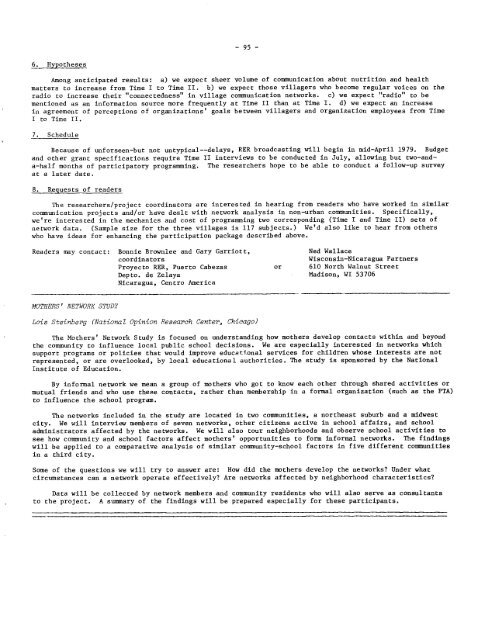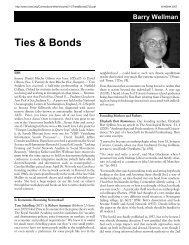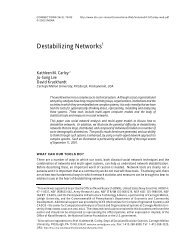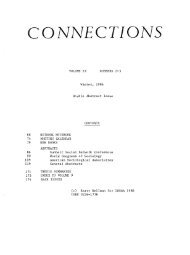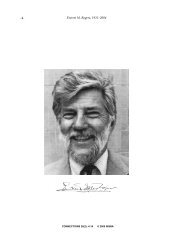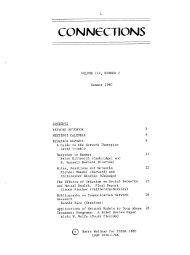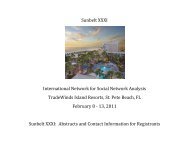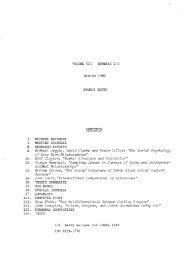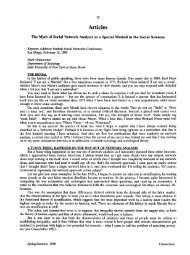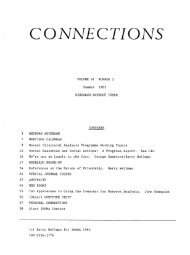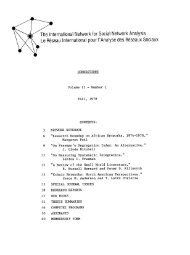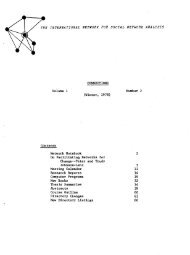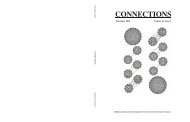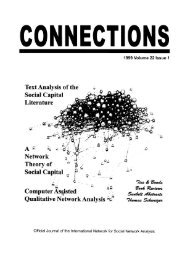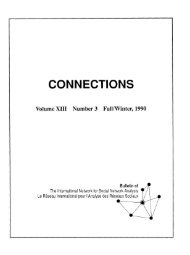staff--two of whom are native Miskito speakers from the region--<strong>and</strong> recording the perception of problems<strong>and</strong> potential solutions from village residents for later playback . Programming workshops will also beheld in the communities selected for study to achieve the greatest possible participation of rural residents. These workshops will be especially designed for those women determined by our detailed evaluationsas marginal in terms of interactive personal networks <strong>and</strong> information sources . Other feedback tools, suchas reading received letters over the air, will also be tried .2 . PurposeAs originally conceived, the broad purpose of RER is to provide useful information in the areas ofnutrition, health, <strong>and</strong> agriculture to the rural population . The underlying assumptions of this approachare that lack of information is the main impediment to change, <strong>and</strong> that needed information is the soleproperty of knowledge "experts ." Within this context, the goals as stated in the original grant proposalare as follows : 1) Measurable changes in knowledge gained in the areas of child care, nutrition, familyplanning, <strong>and</strong> farming methods . 2) A regular listening audience of 80% of the families within the region .3) Reinforcement of radio messages by community health <strong>and</strong> nutrition leaders <strong>and</strong> midwives . 4) A highlevel of confidence in the accuracy of information presented . 5) Regular use of RER by public schoolsystems in supplementing basic courses <strong>and</strong> in the administration of rural public schools . 6) Partial phaseoutof Wisconsin-Nicaragua Partners by September 1980 .Besides being quite vague, these goals are well within the dated "top-down" development philosophywhich the two American co-coordinators of the projects do not feel is in all aspects appropriate . Therefore,we have tried to shift the focus of these goals--primarily using their vagueness as a realistic justification--to 1) a study of how the station fits into formal <strong>and</strong> informal communication networks on subjects ofhealth <strong>and</strong> nutrition among village women of childbearing age, <strong>and</strong> 2) a coorientation study of the perceptionsthese women <strong>and</strong> employees of various educational institutions concerned with nutrition, agriculture, <strong>and</strong>health have of each other, <strong>and</strong> how they change over time . Three villages have been selected for study,including one control village outside the listening area . Time I (before the station goes on the air)interviews have been largely completed by this writing . Time II (after the station has been on the airfor six or more months) interviews are planned for later in <strong>1979</strong> .We believe that results from the evaluation will show whether the radio station plus "participationpackage" (programming workshops, user-initiated feedback techniques, coordination with other educationalorganizations) has been effective in promoting a degree of self-determination in information acquisition<strong>and</strong> utilization . Moreover, we will gain an idea to what extent internal organization is important forthe translation of information into action, i .e ., when internal political/social structures are as importantor more important than simply offering information for social change to occur .3 . Research designThe formal design is a pre-post survey . Time I questions were administered before radio broadcastingbegan ; Time II questions will be asked of the same respondents after programming is underway . Sampleconsists of all women between the ages 15 to 45 (roughly child-bearing age) in three Miskito Indianvillages : two test villages <strong>and</strong> one control village outside broadcast range . All local employees of fiveregional development organizations form part of the sample, as well .4 . Questionnaire- 94 -The questionnaire consists of two parts : A) Network questions to determine where women obtain informationabout nutrition <strong>and</strong> health matters (in terms of both specific people <strong>and</strong> other media sources) ;B) Coorientation questions to determine villagers' perceptions of goals of the development organizationsvs . the goals as enunciated by members of the organizations themselves .5 . InterventionThe research intervention is the implementation of regional educational radio (RER) . This consistsof start-up <strong>and</strong> continuation of regular broadcasting on an AM station that does not now exist . Initialbroadcast schedule is expected to be three to four hours a day . Programming will be largely in the indigenousMiskito language but will be in English <strong>and</strong> the national language of Spanish, as well .A unique aspect of RER--in terms of both programming <strong>and</strong> the study of communication networks--is whatwe call the "participation package ." This package will consist of activities we consider ideal forcommunity-based programming : conducting staff-sponsored workshops in villages to demonstrate the mechanicsof using a cassette tape recorder ; leaving tape recorders in villages, encouraging residents to recordideas, music, concerns ; encouraging villagers <strong>and</strong> local nutrition <strong>and</strong> health leaders to participate by useof various feedback techniques ; enhancing local leaders by including them in regular radio programming ;coordinating efforts with the school system <strong>and</strong> other regional development organizations .
- 95 -6 . HypothesesAmong anticipated results : a) we expect sheer volume of communication about nutrition <strong>and</strong> healthmatters to increase from Time I to Time II . b) we expect those villagers who become regular voices on theradio to increase their "connectedness" in village communication networks . c) we expect "radio" to bementioned as an information source more frequently at Time II than at Time I . d) we expect an increasein agreement of perceptions of organizations' goals between villagers <strong>and</strong> organization employees from TimeI to Time II .7 . ScheduleBecause of unforseen-but not untypical--delays, RER broadcasting will begin in mid-April <strong>1979</strong> . Budget<strong>and</strong> other grant specifications require Time II interviews to be conducted in July, allowing but two-<strong>and</strong>a-halfmonths of participatory programming . The researchers hope to be able to conduct a follow-up surveyat a later date .8 . Requests of readersThe researchers/project coordinators are interested in hearing from readers who have worked in similarcommunication projects <strong>and</strong>/or have dealt with network analysis in non-urban communities Specifically,we're interested in the mechanics <strong>and</strong> cost of programming two corresponding (Time I <strong>and</strong> Time II) sets ofnetwork data . (Sample size for the three villages is 117 subjects .) We'd also like to hear from otherswho have ideas for enhancing the participation package described above .Readers may contact : Bonnie Brownlee <strong>and</strong> Gary Garriott,Ned WallacecoordinatorsWisconsin-Nicaragua PartnersProyecto RER, Puerto Cabezas or 610 North Walnut StreetDepto . de Zelaya Madison, WI 53706Nicaragua, Centro AmericaMOTHERS'NETWORK STUDYLois Steinberg (National Opinion Research Center, Chicago)The Mothers' Network Study is focused on underst<strong>and</strong>ing how mothers develop contacts within <strong>and</strong> beyondthe community to influence local public school decisions . We are especially interested in networks whichsupport programs or policies that would improve educational services for children whose interests are notrepresented, or are overlooked, by local educational authorities . The study is sponsored by the NationalInstitute of Education .By informal network we mean a group of mothers who got to know each other through shared activities ormutual friends <strong>and</strong> who use these contacts, rather than membership in a formal organization (such as the PTA)to influence the school program .The networks included in the study are located in two communities, a northeast suburb <strong>and</strong> a midwestcity . We will interview members of seven networks, other citizens active in school affairs, <strong>and</strong> schooladministrators affected by the networks . We will also tour neighborhoods <strong>and</strong> observe school activities tosee how community <strong>and</strong> school factors affect mothers' opportunities to form informal networks . The findingswill be applied to a comparative analysis of similar community-school factors in five different communitiesin a third city .Some of the questions we will try to answer are : How did the mothers develop the networks? Under whatcircumstances can a network operate effectively? Are networks affected by neighborhood characteristics?Data will be collected by network members <strong>and</strong> community residents who will also serve as consultantsto the project . A summary of the findings will be prepared especially for these participants .


